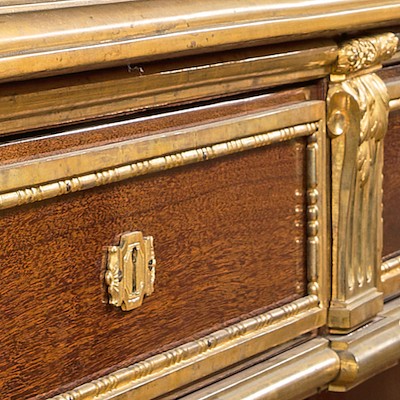ORDER OF MALTA.
Lot 13
Categories
Estimate:
EUR€3,000 - EUR€4,000
$3,409.09 - $4,545.45
Absentee vs Live bid
Two ways to bid:
- Leave a max absentee bid and the platform will bid on your behalf up to your maximum bid during the live auction.
- Bid live during the auction and your bids will be submitted real-time to the auctioneer.
Bid Increments
| Price | Bid Increment |
|---|---|
| No bidding increment | |
About Auction
Catalog Only
By Beaussant Lefèvre & Associés
Dec 13, 2022
Set Reminder
2022-12-13 08:00:00
2022-12-13 08:00:00
America/New_York
Bidsquare
Bidsquare : Furniture and Works of Art from the Anne Aymone and Valery Giscard d’Estaing Collections
https://www.bidsquare.com/auctions/beaussant-lef-vre-associ-s/furniture-and-works-of-art-from-the-anne-aymone-and-valery-giscard-d-estaing-collections-11505
Beaussant Lefèvre & Associés contact@beaussantlefevre.com
Beaussant Lefèvre & Associés contact@beaussantlefevre.com
- Lot Description
ORDER OF MALTA. - BOURBON (Jacques de). La Grande & merveilleuse et trescruelle oppugnation de la noble cité de Rhodes prinse nagueres par sultan Seliman a présent grand Turcq, ennemy de la tressaincte foy catholicque. [And printed in Paris for Gilles de Gourmont [...]. L[']an mil cinq cens .xxvi. au moys de may [i.e. : Paris, by Antoine Couteau for Gilles de Gourmont, May 1526].
In-4, (6)-xliv ff. printed in gothic script, garnet morocco, ribbed spine, gilt Maltese cross in the center of the boards, filleted edges, gilt inner lace, gilt edges (Trautz-Bauzonnet). Volume placed in a modern red morocco case, spine ribbed, white Maltese cross mosaic on a red background and underlined by a gilt fillet in the center of the first plate (probably by the workshop Sangorski & Suttcliffe in London).
Second edition of this text originally published the year before by the same bookseller who had then distributed two issues. Jacques de Bourbon severely criticized the 1525 edition as "corrupt and depraved".
WOODEN ENGRAVED ILLUSTRATION: full-page composition depicting the author at his writing table; title frame; beautiful ornate lettering.
THE HOSPITALIERS DRIVEN OUT OF RHODES BY THE TURKS IN 1522. The knights of the Order of the Hospital of St. John of Jerusalem, who had to leave the Holy Land at the end of the 13th century, had taken Rhodes at the beginning of the 14th century, and had installed their main establishment there. The island had been besieged several times by the Ottomans in the fifteenth century, without success, but the Turkish power had still grown, and Suleiman the Magnificent managed to take Rhodes: it took him, however, six months of siege and the benefit of treachery to achieve his ends. The grand master Philippe de Villiers de L'Isle-Adam and his surviving knights left the island with a few inhabitants on January 1, 1523. It was not until 1530 that the Order would then obtain the island of Malta to settle.
CAPETIAN PRINCE AND CHEVALIER OF RHODES, JACQUES DE BOURBON (ca. 1466-1527) was a descendant of St. Louis and a great-cousin of the Order of Malta.
Louis and was a grand-cousin of François I. The natural son of the future Prince-Bishop of Liege, Louis de Bourbon, he served in the Order of which he was Grand Prior of France, before going to Rhodes. There he witnessed and played a part in the great siege of 1522, during which he was wounded during a sortie alongside Philippe de Villiers de L'Isle-Adam.
AN APOLOGY FOR THE GRAND MASTER AND THE ORDER. In a period of uncertainty and wandering for the knights, Jacques de Bourbon decided to publish a work on the events of 1522. For him, it was a way to show his loyalty to Philippe de Villiers de L'Isle-Adam, who was being slandered for having surrendered, in contradiction with the ethics of chivalry (the Grand Master had nevertheless chosen this solution to spare the people from a disastrous fate). Jacques de Bourbon also wanted to remind us of the danger of Ottoman imperialism, the opportunity to have a Christian stronghold in Rhodes and the usefulness of the Hospitallers' mission.
A PRECIOUS SOURCE FOR THE MILITARY HISTORY OF THE XVIth CENTURY. Jacques de Bourbon had frequented pre-Humanist circles in his youth and knew how to apply in his Oppugnation a true historian's method: rigorous composition, concern for clarity and pedagogy, a sense of observation and detail, a stripped-down style, rejection of direct speech for the words of the persons evoked, etc. He indicates in his prologue that he only reports what he had personally seen or heard narrated by trustworthy people. As a high-ranking knight, he had access to the deliberations and decisions of the Grand Master's Council, as well as to the accounts of envoys or spies on what was happening within the Ottoman general staff. Reconciling the Oppugnation with other existing sources, both Christian and Turkish, has made it possible to highlight its authorial probity and the solidity of its information.
VERY RARE.
Provenance : Bibliotheca Hierosolymitana of M. Chaulet, knight of honor and devotion of the Order of Malta (ex-libris sticker). - Ex-libris stamp with a sun motif on the case, on the binding and on several leaves.



 EUR
EUR CAD
CAD AUD
AUD GBP
GBP MXN
MXN HKD
HKD CNY
CNY MYR
MYR SEK
SEK SGD
SGD CHF
CHF THB
THB












